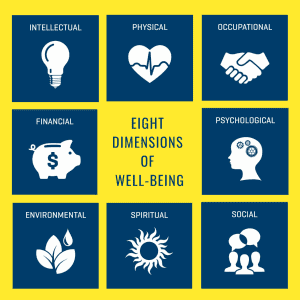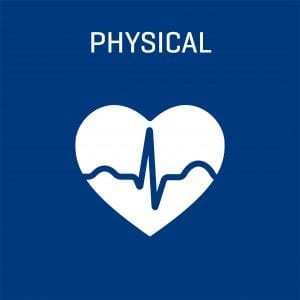
At BCIT, well-being is approached from a holistic perspective using the Eight Dimensions of Well-being framework to support student wellness.
Well-being is a dynamic state in which a person in their environment has the opportunity to balance intellectual, occupational, physical, financial, psychological, environmental, spiritual and social needs to thrive and realize their goals.
Every individual’s optimal well-being is influenced by factors unique to their lives. What may enhance and support one individual’s well-being may not work for another. It is up to us to do our best to maintain a balance that works for our individual needs in all eight dimensions.
Learn more about the eight dimensions

Intellectual well-being can be achieved by recognizing creative abilities and finding new ways to continually expand knowledge and challenge your mind.
Examples of intellectual well-being
Examples of intellectual well-being include:
- Setting academic goals
- Being open to new ideas and opportunities
- Working effectively with peers
- Visiting your instructors during office hours
- Signing-up for summer refresher courses
Intellectual well-being and learning
Maintaining your intellectual well-being can have a positive impact on your learning. Intellectual well-being:
- Encourages learning
- Inspires exploration
- Stimulates curiosity
Improving your intellectual well-being
There are several choices you can make to support your intellectual well-being. Take steps to:
- Minimize your exam stress
- Create a study schedule
- Get enough sleep and eat nutritiously
- Access academic supports
Resources to support your intellectual well-being
BCIT offers a wide range of student services, many of which can help support your intellectual well-being. For more information, see:
For a full listing of services available to students, visit BCIT’s Student Services page.

Occupational well-being can be achieved by creating networks, building skills, and enriching oneself through various career opportunities.
Examples of occupational well-being
Examples of occupational well-being include:
- Creating a work-life balance that supports your well-being
- Improving resume & cover letter
- Joining a leadership or mentorship program or club at BCIT
- Networking with other professionals in your field
- Setting career goals
- Volunteering or gaining work experience
Occupational well-being and learning
Maintaining your occupational well-being can have a positive impact on your learning. Occupational well-being can provide you with:
- Support from colleagues/peers
- An understanding of your strengths and weakness
- Continuous professional growth
- The self-awareness to find work that is consistent with your values
- Personal satisfaction and enrichment in life
Improving your occupational well-being
It’s important to make choices that support your occupational well-being. To improve your occupational well-being, take steps to create a sense of direction and purpose for your career.
Resources to support your occupational well-being
BCIT offers a wide range of student services, many of which can help support your occupational well-being. For more information, visit eJOBS.
For a full listing of services available to students, visit BCIT’s Student Services page.

Physical well-being can be achieved by creating opportunities and recognizing the need for sleep, healthy eating, active living, and self-care practices.
Examples of physical well-being
Examples of physical well-being include:
- Being active & exercising
- Healthy eating & sleeping habits
- Visiting health care professionals for regular check-ups
- Practicing safer sex
- Limiting substance use
Physical well-being and learning
Maintaining your physical well-being can have a positive impact on your learning. Physical well-being can:
- Increase concentration
- Improve memory retention and recall
- Increase energy
- Decrease stress
Improving your physical well-being
There are several choices you can make to support your physical well-being. Take steps to:
- Incorporate activity into your everyday schedule
- Build healthy and nutritious eating habits
- Practice safer sex
- Get enough sleep so that you feel rested
Resources to support your physical well-being
BCIT offers a wide range of student services, many of which can help support your physical well-being. For more information, see:
For a full listing of services available to students, visit BCIT’s Student Services page.

Financial well-being can be achieved by being aware of and satisfied with your current financial situation and foreseeable future financial situations.
Examples of financial well-being
Examples of financial well-being include:
- Setting financial goals & budgeting
- Looking for work
- Earning a sufficient income & filing income taxes
- Building a strong credit history
- Carpooling
Financial well-being and learning
Maintaining your financial well-being can have a positive impact on your learning by reducing financial distress. Reduced financial distress can lead to improvements your health, and to your academic performance.
Improving your financial well-being
There are several choices you can make to support your financial well-being. Take steps to:
- Live within your means by limiting expenses
- Identify and address any financial problems before they start
- Take advantage of student discounts and student employment services
- Plan ahead and set budget goals
Resources to support your financial well-being
BCIT offers a wide range of services available to students, many of which can help support your financial well-being. For more information, see Student Financial Aid & Awards.
For a full listing of services available to students, visit BCIT’s Student Services page.

Psychological well-being can be achieved by maintaining a positive outlook on life by developing effective coping strategies to reduce and manage stress, and through accepting and exploring oneself.
Examples of psychological well-being
Examples of psychological well-being include:
- Acknowledging and managing causes of stress
- Being aware of thoughts your and feelings
- Surrounding yourself with supportive & positive people
- Using services and supports when in need
Psychological well-being and learning
Maintaining your psychological well-being can have a positive impact on your learning. Psychological well-being:
- Inspires self-care and the development of inner strength
- Encourages effective decision-making
- Reduces stress
Improving your psychological well-being
There are several choices you can make to support your psychological well-being. Take steps to:
- Maintain a positive outlook
- Find balance in a busy schedule
- Learn to manage worries about exams, work, relationships and other challenges
Resources to support your psychological well-being
BCIT offers a wide range of services available to students, many of which can help support your psychological well-being. For more information, see Counselling & Student Development.
For a full listing of services available to students, visit BCIT’s Student Services page.

Environmental well-being can be achieved by finding an awareness and balance of interactions between ourselves, our environment, and our community.
Examples of environmental well-being
Examples of environmental well-being include:
- Being aware of the risks and resources in your surrounding environment
- Spending time outdoors
- Reducing, reusing, recycling
- Respecting others’ personal space and boundaries
- Using sustainable modes of transportation
- Seeking environments that are conducive to your well-being
Environmental well-being and learning
Maintaining your environmental well-being can have a positive impact on your learning in the following ways:
- By enhancing a sense of safety and security, which can decrease anxiety
- Calm environments can help with concentration and focus
- Spending time outdoors can reduce stress
Improving your environmental well-being
There are several choices you can make to support your environmental well-being. Take steps to:
- Embody an eco-friendly lifestyle
- Be aware of your personal safety in your environment
- Seek and create supportive environments
Resources to support your environmental well-being
BCIT offers a wide range of services available to students, many of which can help support your environmental well-being. For more information, see:
For a full listing of services available to students, visit BCIT’s Student Services page.

Spiritual well-being can be achieved by having a sense of purpose and meaning in life, respecting the personal values and beliefs of others and understanding and aligning your own beliefs with your actions.
Examples of spiritual well-being
Examples of spiritual well-being include:
- Meditating or praying (exploring the mind-body connection)
- Having a strong sense of purpose and peace
- Being aware of and respect for your values
Spiritual well-being and learning
Maintaining your spiritual well-being can have a positive impact on your learning. Spiritual well-being can help support:
- Academic achievement
- Stronger engagement in health-promoting behaviors
- Higher levels of social support and life satisfaction
Improving your spiritual well-being
There are several choices you can make to support your spiritual well-being. Take steps to:
- Reflect on your personal values and beliefs
- Learn about and respect the beliefs and values of others
- Find connection with others who share the same beliefs and values
Resources to support your spiritual well-being
BCIT offers a wide range of services available to students, many of which can help support your spiritual well-being. For more information, see:
For a full listing of services available to students, visit BCIT’s Student Services page.

Social well-being can be achieved by developing and maintaining a sense of connection and belonging through healthy relationships and support systems.
Examples of social well-being
Examples of social well-being include:
- Developing healthy relationships & networking
- Having a sense of belonging
- Respecting others’ identities
- Spending time with friends, family and your community
Social well-being and learning
Maintaining your social well-being can have a positive impact on your learning. Social well-being can:
- Increase your self-esteem
- Encourage communication, trust and conflict management with others
- Help build emotional resilience
Improving your social well-being
There are several choices you can make to support your social well-being. Take steps to:
- Look for opportunities to meet new people
- Build healthy relationships with friends, peers, family and loved ones
- Practice and develop your intercultural skills
Resources to support your social well-being
BCIT offers a wide range of services available to students, many of which can help support your social well-being. For more information, see:
For a full listing of services available to students, visit BCIT’s Student Services page.